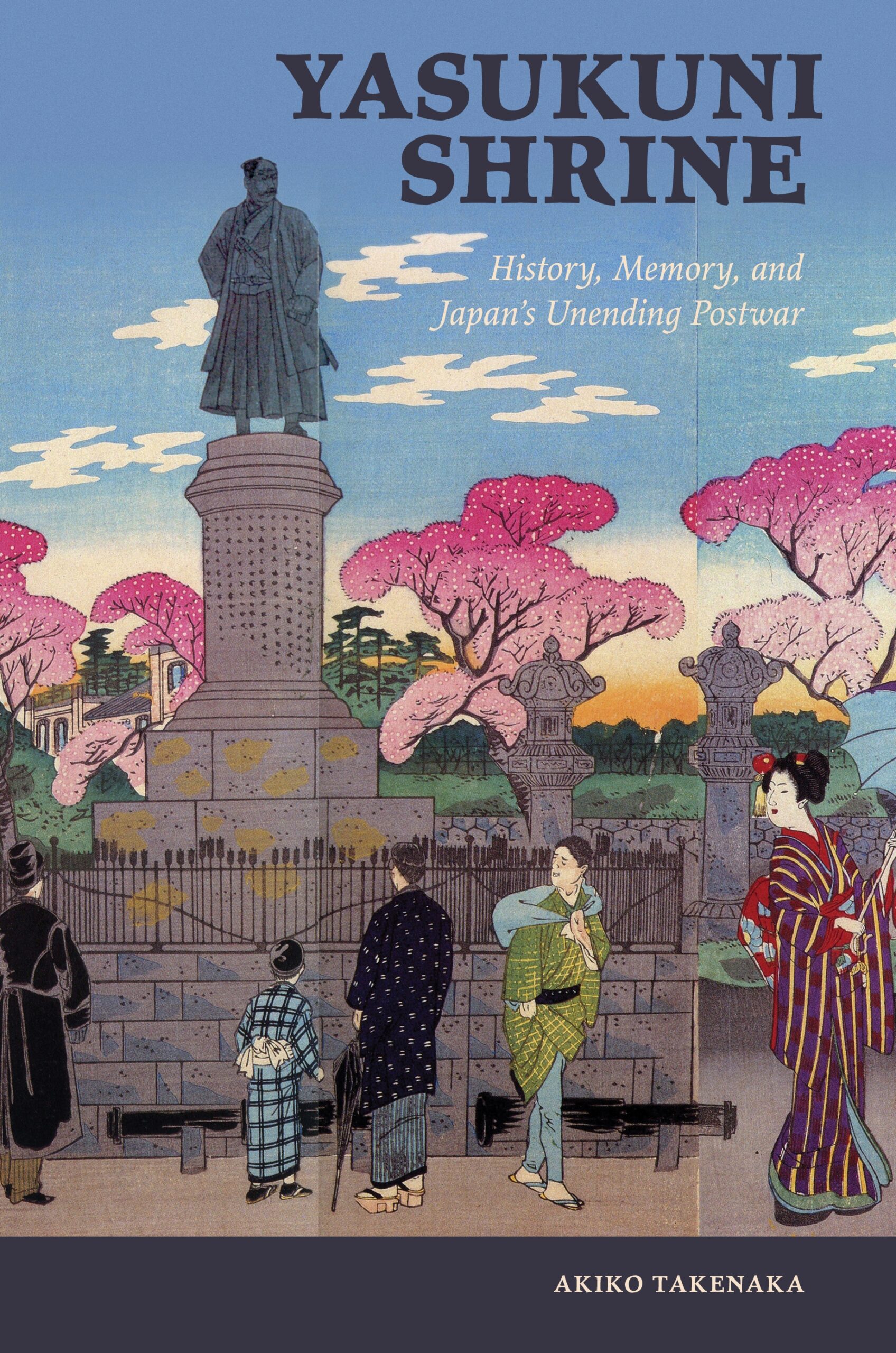Yasukuni Shrine: History, Memory, and Japan’s Unending Postwar
- About the Book
-
This is the first extensive English-language study of Yasukuni Shrine as a war memorial. It explores the controversial shrine’s role in waging war, promoting peace, honoring the dead, and, in particular, building Japan’s modern national identity. It traces Yasukuni’s history from its conceptualization in the final years of the Tokugawa period and Japan’s wars of imperialism to the present. Author Akiko Takenaka departs from existing scholarship on Yasukuni by considering various themes important to the study of war and its legacies through a chronological and thematic survey of the shrine, emphasizing the spatial practices that took place both at the shrine and at regional sites associated with it over the last 150 years. Rather than treat Yasukuni as a single, unchanging ideological entity, she takes into account the social and political milieu, maps out gradual transformations in both its events and rituals, and explicates the ideas that the shrine symbolizes.
Takenaka illuminates the ways the shrine’s spaces were used during wartime, most notably in her reconstructions, based on primary sources, of visits by war-bereaved military families to the shrine during the Asia-Pacific War. She also traces important episodes in Yasukuni’s postwar history, including the filing of lawsuits against the shrine and recent attempts to reinvent it for the twenty-first century. Through a careful analysis of the shrine’s history over one and a half centuries, her work views the making and unmaking of a modern militaristic Japan through the lens of Yasukuni Shrine.
Yasukuni Shrine: History, Memory, and Japan’s Unending Postwar is a skilled and innovative examination of modern and contemporary Japan’s engagement with the critical issues of war, empire, and memory. It will be of particular interest to readers of Japanese history and culture as well as those who follow current affairs and foreign relations in East Asia. Its discussion of spatial practices in the life of monuments and the political use of images, media, and museum exhibits will find a welcome audience among those engaged in memory, visual culture, and media studies.
- About the Author(s)
-
Akiko Takenaka, Author
Akiko Takenaka is professor of Japanese history at the University of Kentucky.
- Reviews and Endorsements
-
- Takenaka’s history of Yasukuni—the first such study in English—is a dense research monograph that offers a wealth of often-surprising information . . . Modern Japanese historians, meanwhile, will find Takenaka’s Yasukuni Shrine indispensable, and journalists covering contemporary memory wars might profit particularly from the chapters on select postwar cases of controversy.
—Monumenta Nipponica - Takenaka’s determined effort to relate as well as interpret the shifting dynamics of history, belief, state policies, culture, and personal involvement through eight decades of social change is a significant achievement. It will serve as both a pivot and catalyst for future studies that, like the current work, attempt a fuller comprehension of this institution and all it encompasses.
—H-Net Reviews - This book is essential reading for anybody interested in Japan’s twentieth century, where concerns over Yasukuni shrine influence Northeast Asian politics, as well as scholars who focus on Japanese memory and religion. If religion is, indeed, a “chain of memory,” Yasukuni is one of the most important links in Japan’s own chain, and Takenaka’s book does much to promote our understanding of it.
—American Academy of Religion - Its a clear and compelling study of an important issue that will be of interest to many readers. Enjoy!
—New Books Network - Akiko Takenaka has done what no one else in the English-language literature has, namely, historicize Yasukuni Shrine from its pre-Meiji Restoration lineages to the present. In addition to generating considerable interest both within and beyond modern Japanese studies, this work will provide instructors with a much-needed, nuanced history of the shrine to help them understand and teach a topic that is currently front and center in East Asia’s memory wars.
—Kenneth Ruoff, Portland State University - In this elegant exposition Akiko Takenaka unravels the ways in which individuals have engaged the war dead, collectively and on their own. She brilliantly shows how through Yasukuni Japanese have learned about national wars as a defining feature of modern existence. Of specific interest is her discussion on subjects who have not participated in war but must ‘know’ it as elemental to their identities.
—Alexis Dudden, University of Connecticut - The present-day politics of Japan’s controversial war shrine are famous, but few have examined the nature of the site itself and how it came to be. In this important study we have the first substantial account in English of Yasukuni’s history. Takenaka uncovers the gradual process beginning in the late nineteenth century through which the customs and beliefs of ordinary citizens were absorbed into the state military cult. She demonstrates that it was an uneven process. Yasukuni functioned as a site not only of militarist indoctrination but of both modern mass leisure and intimate sentiments. Takenaka’s insightful analysis of the shrine’s multi-layered past sheds light on the complex emotions surrounding its present.
—Jordan A. Sand, Georgetown University
- Takenaka’s history of Yasukuni—the first such study in English—is a dense research monograph that offers a wealth of often-surprising information . . . Modern Japanese historians, meanwhile, will find Takenaka’s Yasukuni Shrine indispensable, and journalists covering contemporary memory wars might profit particularly from the chapters on select postwar cases of controversy.
- Supporting Resources
-





